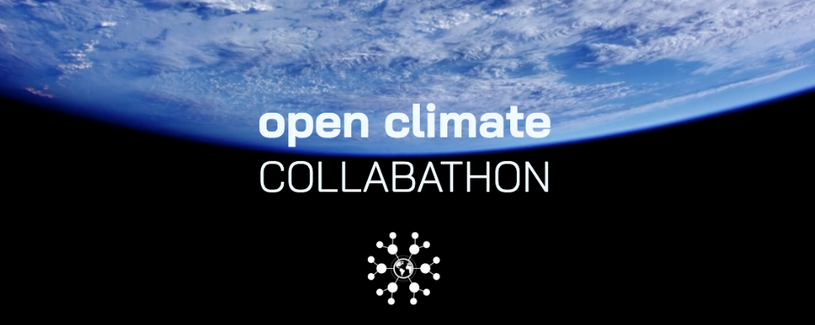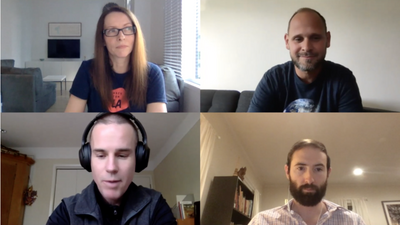Open Climate Collabathon 2020 kicks off and encourages radical collaboration to tackle climate change in the time of COVID-19
Open Climate, an open-source project developing a global climate accounting system, launches it’s second collaborative hackathon aiming to help the world meet the goals of the Paris Agreement.

The second Open Climate Collabathon kicked off the 2020 year on April 22-24 with an Open Climate Dialogues series, an online event that included an international panel of speakers as well as a weekend-long collaborative hackathon. The event was centered on the idea of “radical collaboration,” uniting technologists and climatologists from around the world to build the Open Climate Platform, an open-source and not-for-profit climate accounting system designed to track accountability to carbon budget pledges. With topics ranging from next-gen technologies to government and civic group impact, the event brought together hundreds of participants for discussions and facilitated the formation of collaborative teams that will now collaborate throughout the year to further develop the Open Climate Platform.
The current global shutdown shows the need for working together to solve complex challenges, regardless of physical proximity. Using digital tools to foster radical collaboration was a guiding principle of the Open Climate Collabathon long before the COVID-19 crisis. In November 2019, the first iteration of the collabathon brought together more than 350 registered participants spread across 7 countries, culminating in several presentations and press events at the United Nations Climate Change Conference (COP 25) in Madrid in December. Much of the work happened in a digital environment that included four different software platforms.
The 2019 event was organized by the Yale Open Innovation Lab, but the initiative has now spun-off to become a digital civic movement of its own. Anyone interested in collaborating with one of the projects in progress or organizations interested in sponsorships can reach out to the organization through the website.
“After last year’s success and all the traction we got at COP 25, this time the organization is taking on a different dimension,” points out Martin Wainstein, founder and lead scientist behind the Yale Openlab and the Open Climate project. In 2019 teams were asked to collaborate towards several goals in technical and strategic scope, such as representing the Paris Agreement through a web of smart contracts, creating an aggregated near-real-time atmospheric carbon budget counter, and proposing green bond implementation strategies.
This year’s Collabathon is planned to be a year-long event lasting until November and having multiple dates as execution sprints, the first being Earth Week, and the final being the Global Collabathon Week in November during the now-postponed COP 26. The November summit and hackathon will act as an independent approach and effort to the Global Stock Take, the global accounting process that the Paris Agreement has laid out.
Open Climate was created in 2018 as a not-for-profit open source project that aims to bring transparency to global carbon accounting. It uses many emerging technologies such as blockchain and IoT to implement this, hoping to facilitate collaboration and accountability between countries and corporations who are committed to curbing human emissions and limiting global warming. The project is fundamentally technology agnostic and blockchain ecosystem agnostic. In fact it focuses primarily on interoperability and platform integrations. Some of the technology functions being used currently come from both the Hyperledger and Ethereum, with a specific focus on decentralized identifiers and verifiable credentials such as those from Hyperledger Indy and Aries.
The Open Climate Collabathon was created as a grass-roots initiative to support the development of the Open Climate Platform by attracting people and partners from across the world who want to collaborate to help solve the imminent climate challenge through transparency, technology, and social innovation.
The idea of radical collaboration is the main driver of both the event and the platform, inspiring organizers and participants to form systemic collaborations that can tackle the systemic challenges. “My favorite part about the Collabathon is that you get to meet like-minded people from all over the world who care about climate change and are willing to spend their weekend actually doing something for it instead of just talking or posting things online,” commented Yale student Shuran Wei, one of last year’s participants.
The Collabathon’s global network is organized through multiple Nodes and ambassadors that act as centers of gravity for participants. Nodes are typically Universities and civic tech groups that host an instance of the event in their venues or virtually and provide mentors with subject-domain expertise. Some of the Nodes assembled in 2019 include HEC Paris, the Asian Institute of Management in the Philippines, the Yale-NUS College in Singapore, and the Hyperledger Climate Action and Accounting Special Interest Group. The application to join the network as nodes and ambassadors will remain open throughout the year.
The 2020 Open Climate Collabathon organizing team includes Yale OpenLabs, Code for America, Net Impact ESMT Berlin, CoMakery, and Sensorica. For sponsorship and participation, information is available at: https://www.collabathon.openclimate.earth/collabathon.
About Open Climate Collabathon
The Open Climate Collabathon was initially developed and incubated at the Yale Open Innovation Lab through the Yale Center for Business and the Environment (CBEY) and the Tsai Center for Innovative Thinking at Yale (CITY). It was launched in 2019 as a proof-of-concept in the lead up to the UNFCCC COP25 climate summit.
In 2020, the Collabathon was relaunched as a non-profit initiative hosted by the Open Collective Foundation, organized by a collective of organizations (i.e. the co-organizing team) and governed by principles of do-ocracy. The co-organizing team is expected to commit efforts throughout a year-long campaign, upon which the group is open for new organizers and team reconfigurations.
Contact:
Martin Wainstein, PhD
